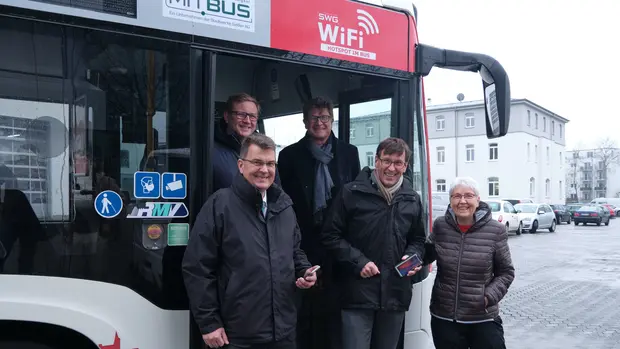
From January, Stadtwerke Gießen and its subsidiary MIT.BUS will be offering free WLAN for their passengers.
Virtually all experts agree that the transport revolution can only succeed if more people leave their cars behind in future and switch to buses, trains and other environmentally friendly modes of transport. In order for this to happen, existing local transport services need to be improved. "This is exactly what we are constantly working on," explains Jens Schmidt, Commercial Director of Stadtwerke Gießen (SWG). This is already reflected in the various services available that make travelling on Giessen's city buses more pleasant or easier.
The latest addition to this optimisation package is a new service that will be available in all vehicles from January - with the exception of five buses that will be parked in a few weeks' time: free Wi-Fi. "We are bringing the SWG WLAN familiar from Giessen city centre and the Ringallee outdoor pool to the buses," explains Matthias Funk, Technical Director of SWG. This also clarifies how passengers can easily log in. Registration follows the same principle. Simply tick the box to agree to the General Terms and Conditions and start surfing, checking and replying to messenger messages or using many other services that are based on an Internet connection. "We want to offer our passengers real added value with the Wi-Fi," says Mathias Carl, Managing Director of MIT.BUS, explaining why the buses are equipped with the necessary hardware. The SWG local transport subsidiary is investing around 50,000 euros a year in the new service.
Cooperation with RMV
In addition to the pioneering NV-ProVi big data project, which provides passengers with information on punctuality and current seat occupancy in real time, the new Wi-Fi in Giessen's city buses is another important step towards more digitalisation in local transport. SWG and MIT.BUS are relying on the system offered by Rhein-Main-Verkehrsverbund Servicegesellschaft (rms), a subsidiary of RMV, to the association's member companies. Basically, it works like the home router. However, the connection to the Internet is not established via a telephone or fibre optic cable, but via mobile communications. This means that each bus is connected to the LTE network via a SIM card. This ensures sufficient bandwidth. And the more than sufficient data volume is guaranteed by the joint contract. "We assume that all passengers will be able to travel online as usual," says Alexander Wright, Chairman of the SWG Supervisory Board.
Convenient access to the Internet via WLAN ideally complements an existing RMV and SWG service: the Livemap, which provides passengers with all kinds of useful information in real time - on capacity utilisation, punctuality or the next connection.
Five latecomers
There is a good reason why not all buses are equipped with WLAN access points right from the start. "We replace the five outstanding vehicles on a regular basis in March," explains Mathias Carl. It therefore didn't make economic sense to equip them accordingly for two to three months. "The new vehicles will have the necessary technology on board from the very first journey," promises the Managing Director.
With free Wi-Fi for passengers on Giessen buses, SWG is optimising local public transport once again. "Admittedly, the new service is not a ground-breaking innovation. But it helps to make local transport services a little more attractive again and hopefully encourages more and more people to use the bus for journeys in Giessen. No more, but also no less," says city councillor Gerda Weigel-Greilich. In fact, there are many perfectly sensible scenarios conceivable. Keyword: travelling to work. Instead of losing time in traffic jams, passengers can do things on the bus that would otherwise take up valuable free time.

